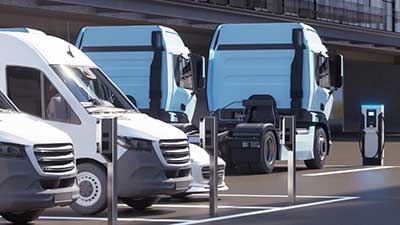Date: 01/04/2023
Relevance: GS-3: Science and Technology- developments and their applications and effects in everyday life: Conservation, environmental pollution and degradation, environmental impact assessment.
Key Phrases: Cell Manufacturing, Decarbonisation, International Council on Clean Transportation, Carbon Emissions, Incentivisation, Subsidies, Life, Road Transport, Electric Vehicles.
Context:
- The registration of electric vehicles (EVs) has seen significant
growth in recent years, reflecting a global trend towards sustainable
transportation.
- However, to ensure the continued growth of the EV market, government support is critical.
Introduction:
- The quest for "decarbonisation" is considered the ultimate objective for those fighting climate changes. Global climate negotiations, up to this point, have been filled with vague statements and speeches.
- Developed nations would intimidate the poorer ones on their climate
obligations, while nations like India would argue for "shared but
differentiated responsibilities." The main sticking point has been
emissions reduction commitments.
- While a consensus on this issue is still out of reach, a noteworthy advancement in the decarbonisation of one specific sector has emerged.
- Road transport has received significant political support,
particularly from G20 nations, thanks to the transition to electric
mobility.
- This year, India's leadership of the G20 has been centered on the "LiFE - Lifestyle for Environment" program.
Global Scene:
- According to the International Council on Clean Transportation's analysis of global trends, sales of light duty electric vehicles (EVs) accounted for 9% of all light duty vehicles in 2021, which increased to 13% towards the end of 2022.
- China has already crossed the 20% mark in EV sales, while Europe is closely trailing behind. In a bold move, California has announced its plan to shift to 100% zero emission vehicles by 2035.
- The UK has announced that all new cars and vans will be zero emission by 2035, while putting an end to the sale of new petrol and diesel vehicles by 2030.
- Germany crossed the one million electric vehicle mark last year.
In the heavy-duty vehicle segment, buses are leading the charge.
- Shenzhen, in China, boasts of the largest electric bus fleet in the world, with over 16,000 buses:
India’s Position:
- India's electric vehicle (EV) adoption rate is still relatively
low, with only 5% of new vehicle registrations being electric in 2022.
- However, large cities are leading the way, with tier-two and tier-three cities catching up quickly.
- For example, in Delhi, over 10% of new vehicle registrations were electric.
- The pattern of electrification varies across the country, with
some states such as Uttar Pradesh and Maharashtra having high adoption rates
due to e-rickshaws and two-wheelers.
- In Andhra Pradesh, Karnataka, and Gujarat, more than 90% of EVs are two-wheelers. In Delhi, 55% of EVs are two-wheelers, while 34% are a mix of auto-rickshaws and e-rickshaws.
- The adoption of electric four-wheelers is relatively slower, with the largest share being in Delhi, Maharashtra, and Telangana.
Government Backing:
- The government is strongly supporting the electrification of public transport, offering subsidies to manufacturers through the Central Government and using demand aggregation for procurement across cities to reduce the cost of electric buses.
- Under the national bus electrification programme, an ambitious plan has been announced to introduce 50,000 electric buses across the country.
- Delhi is on track to introducing 8,000 e-buses by 2025, while Mumbai, Hyderabad, Bengaluru, and Kolkata are equally enthusiastic. Some private bus operators, supported by global investment funds, have started intercity electric bus operations.
The Road Ahead:
- The road ahead is challenging, in the medium term, subsidies for
EV buyers or sellers are expected to dry up. As a result, it is essential to
offset the inherent cost disadvantage through production efficiencies.
- Batteries account for almost 40% of an EV's cost, but cell manufacturing is still in its early stages in India, despite the Central Government's aggressive push, which is expected to yield results in the next few years.
- It is crucial to plan charging infrastructure scientifically, not
only in cities but also along highways.
- The Central Government has initiated a program to electrify highways using solar energy, which could facilitate the adoption of heavy-duty and medium-duty trucks that contribute significantly to pollution.
- To achieve true zero-emission, the power source for
electrification must come from green energy. Otherwise, current models are
merely transferring the pollution burden.
- Additionally, it is imperative for corporate India to back up their statements with financial support. Mere long-term aspirations will not be enough.
Conclusion:
- It is remarkable to see the progress made by many countries in
the decarbonization of road transport, especially electrification mobility.
- India is also moving in the same direction, with electrification of public transport, and the rise of EVs in commercial operations.
- However, there are still significant challenges to face, from subsidies, charging infrastructure, green power sources, and corporate India putting money where it's needed.
- India can take G20 summit as an opportunity to showcase global leadership and announce a roadmap for decarbonizing transport to set an example for the rest of the world.
Source: The Hindu BL
Mains Question:
Q. What is the significance of decarbonisation of road transport and how is it being driven by the electrification of mobility? What role can India's leadership of G20, with its focus on "LiFE - Lifestyle for environment," play in promoting the decarbonisation of road transport? (250 words).






















